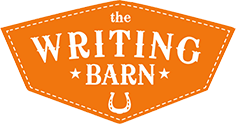By Jessica Hincapie
The Writing Barn is thrilled to be kicking off the year with our newest program, Austin Author Spotlight, in which each month The Writing Barn will interview a local author about his or her upcoming work, and then later host them for a free Wine and Words event the third Wednesday of every month.The literary community in Austin never ceases to amaze, and The Writing Barn is honored to help bolster that community and share with the rest of the world the extraordinary talent living in our own back yards.
For the Austin Author Spotlight debut, The Barn was lucky enough to interview fiction author Mary Helen Specht about her latest novel, Migratory Animals, which will be published by Harper Perennial on January 20, 2015. From the multi-faceted landscape of a foreign country like Nigeria to the easily recognizable setting of our very own city, Specht colors her novel with unique and painstakingly honest perspectives. Don’t miss out on what is sure to be an outstanding debut novel.
Austin Author Spotlight
with Mary Helen Speech
Where did you get the idea for your latest book?
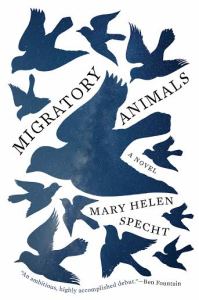 We probably only get to live one life; writing fiction allows me, for a time, to embody what it’s like to be someone else born into a different context, with different desires and challenges. As with most of my ideas, this novel began with a lot of “what if”s. I’d left Nigeria, but what if I were a different sort of person and had stayed? What if there was an American scientist who felt she’d finally found love and a home in West Africa but wasn’t allowed to stay? During this time, I was also watching the recession ravage people, many of whom were well-educated and ambitious, people who’d always expected adult lives at least as successful as those of their parents. I was particularly drawn to the stories of people I knew who were second-generation immigrants and had been taught that graduating from a good college with a good education was all that was needed to propel themselves into the middle-class. The recession highlighted how the system is still so rigged in favor of the privileged, and I tried to explore some of that in Migratory Animals.
We probably only get to live one life; writing fiction allows me, for a time, to embody what it’s like to be someone else born into a different context, with different desires and challenges. As with most of my ideas, this novel began with a lot of “what if”s. I’d left Nigeria, but what if I were a different sort of person and had stayed? What if there was an American scientist who felt she’d finally found love and a home in West Africa but wasn’t allowed to stay? During this time, I was also watching the recession ravage people, many of whom were well-educated and ambitious, people who’d always expected adult lives at least as successful as those of their parents. I was particularly drawn to the stories of people I knew who were second-generation immigrants and had been taught that graduating from a good college with a good education was all that was needed to propel themselves into the middle-class. The recession highlighted how the system is still so rigged in favor of the privileged, and I tried to explore some of that in Migratory Animals.
You were a Fulbright scholar in Nigeria, how did spending time in that landscape shape your use of Nigeria as a setting in Migratory Animals?
One of my areas of research in Nigeria was the literary representation of Africa by westerners. So, I was very aware of (sometimes paralyzed by) the pitfalls that come with writing about a historically marginalized country (which is not to say that I managed to avoid all these pitfalls). Most importantly, I didn’t want to portray Nigeria one-dimensionally, when in reality it’s a country with both rural huts and gleaming modern houses, villages without running water and complex concrete flyovers. I wanted to be true to the ways in which Nigeria is unique while avoiding reinforcing stereotypes. While I didn’t begin writing the novel until I returned, I did bring back notebooks filled with descriptions, which I later combed for the details and images I thought would do the most work in illustrating this complexity. For example, in the prologue of Migratory Animals, there is a description of a woman wearing a traditional West African wrap while carrying a brand-new computer monitor on her head across the university campus.
Kirkus says of Migratory Animals: That it is “A finely wrought first novel. . . . Specht weaves fascinating details on snowflakes, weaving, birding, genetics and engineering, plus a spot-on-portrait of Austin.” What’s it like to capture Austin on the page, alongside such other local luminaries as Sarah Bird?
Capturing Austin was harder than I thought it would be. It’s become a hip enough city that it now has associations in the wider world—live music, food trucks, hipster mustaches, barbecue, the pink Capitol dome, the Keep Austin Weird campaign. And, yet, most outsiders don’t have a real, multilayered understanding of the city, as they might NYC or San Francisco, for example. This made it difficult not to capitalize on the city’s clichés, turning it into a cartoon taco of itself. A writer friend of mine, Debra Monroe, read an early draft of the novel and told me to tone down my Austin descriptions by half—and she was right, and I did. My hope is that by the final draft, I managed to not only capture what Austin is known for with a lighter hand, but also to use setting to explore the more complex history of geographic segregation and the city’s increasing problems with gentrification and affordability.
What did you find most challenging with your current novel?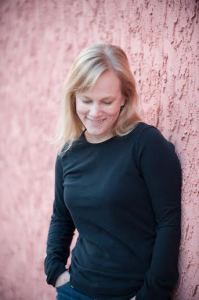
All of it. But certainly the prologue has been the most worked over part of my novel. Each time I changed anything major about the rest of the book during a revision, the prologue would suddenly seem off. I’d lost the right emphasis or tone for what came next—a reverse domino effect. The fact that the prologue is set in Nigeria was another challenge—I needed to provide both the big picture trajectory of Flannery’s time in Nigeria while also rooting the reader in scene. I finally found my structure when I was on a plane reading Jhumpa Lahiri’s story collection Unaccustomed Earth. One of her stories makes this beautiful transition from a distant character introduction into a zoom-in on one intimate scene. That was the structural inspiration for what ultimately became the opening of my novel.
What everyday experiences inform your writing?
I don’t fully understand how I arrive at my characters. And when I say that, it’s not because I’m channeling them from the ‘other side’ in some mystical artistic process. I’m aware of myself as creator, but it’s hard to articulate where life ends and the imaginative re-working of it begins. It usually begins with curiosity about something I’ve experienced or observed. For example, Huntington’s Disease entered as a thread in my novel when, while driving to visit my parents, I heard Charles Sabine, the former war correspondent, speak on NPR about his family’s experiences with the disease and his wrenching decision to get tested. There is no cure for HD, so getting tested for this disease is particularly fraught. I was moved by his story, and it got me thinking about how HD, where children watch a parent die slowly from horrific symptoms that they have a fifty percent chance of inheriting, is a twisted and magnified version of what most of us go through on some level: watching our parents age and die, knowing that, in a way, we are watching our future selves.
The character Alyce emerged from my interest and observations concerning the culture of contemporary motherhood—she struggles with connecting emotionally with her children, which is something that is not really viewed as okay in our society. The child-mother bond is commonly viewed as something natural and automatic, a bolt of lightning that hits every woman when she first sees her baby, though in reality this isn’t necessarily the case. So, I began by exploring that idea and, through many drafts, Alyce took on a constellation of other characteristics that ultimately, I hope, made her feel real and independent. Only after I am confident in the characters as people does the plot begin to emerge for me. I begin asking more “what if”s: What if Alyce were in this situation, or that one? What would she do? How would she react?
Which books or authors have inspired you most?
I learn to write from reading good books. There are a number of contemporary novels that I looked to specifically as sort of “mentor texts” for Migratory Animals: Jennifer Egan’s Visit from the Goon Squad, Colum McCann’s Let the Great World Spin, Tea Obreht’s The Tiger’s Wife are all told in a kaleidoscope of multiple points of view, which was something I was attempting in MA. (Early drafts of my novel had ten point-of-view characters, which I eventually pared down to four.) Also, I looked at Claire Messud’s The Emperor’s Children, which focuses on a tight group of fri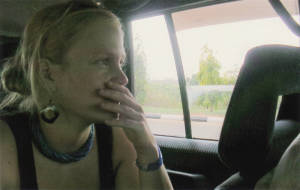 ends trying to make their way into adulthood as well as Barbara Kingsolver’s The Poisonwood Bible, and to some extent, Chimamanda Ngozi Adichie’s Half a Yellow Sun, which both explore what happens when a group of westerners try to make a home in West Africa.
ends trying to make their way into adulthood as well as Barbara Kingsolver’s The Poisonwood Bible, and to some extent, Chimamanda Ngozi Adichie’s Half a Yellow Sun, which both explore what happens when a group of westerners try to make a home in West Africa.
In terms of the larger literary influences in my life, these are the authors I return to again and again: Virginia Woolf, Michael Ondaatje, Zora Neal Hurston, Marilynn Robinson, Toni Morrison, Alice Munro.
We feature a post on our site called Rejecting Rejection, where authors discuss their reactions to past rejected works. How do you, as an author, deal with rejection?
I’m not sure the sting of rejection ever goes away entirely, but I’ve found a few tricks that help me. The first is meditation. If you’re a writer and you don’t meditate, you should start. Buy a book or a CD or take a class, whatever. It’s the only thing I’ve found that helps me to occasionally gain perspective on the ups and downs of the writing career. Secondly, I try to make my goals about the writing and never about the reception of the writing (and this is difficult for a Type A personality like myself). I never say, ‘I’m going to get a story in three magazines this year’, or ‘I’m going to sell a book by Thanksgiving,’ or anything like that. My goals are about word counts or finishing a draft of spending so many hours with my butt in the chair. These are the ways I remind myself that writing is the reason I write.
The Writing Barn is very much about atmosphere and creating the perfect place to think and write, is there an Austin hotspot that you enjoy going to for a little writing or brainstorming time?
I grew up in Texas, but I left in my early twenties and didn’t expect to ever return here to live. When I was lucky enough to get the Dobie-Paisano fellowship on a ranch outside of Austin, I still figured I would leave again when it was over. Austin changed my mind. The writing community was so vibrant and warm and welcoming that I decided to stick around and see what happened. That was five years ago. I ended up being hired to teach fiction at St. 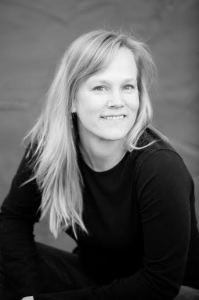 Edward’s University, where I have amazing students and colleagues, and I have no plans to leave again any time soon.
Edward’s University, where I have amazing students and colleagues, and I have no plans to leave again any time soon.
Some of my best ideas come to me while floating on my back in Barton Springs in the early morning or on the bus I take to work or dinner or wherever. If I had any advice to give to aspiring writers, it would be: read more than you write, keep your expenses low, and take the bus whenever you can.
Mary Helen Specht was born and raised in Abilene, Texas. She has a B.A. in English from Rice University and an M.F.A. in creative writing from Emerson College, where she won the department’s fiction award. Her writing has been nominated for multiple Pushcart Prizes and has appeared in numerous publications, including: The New York Times; The Colorado Review; Prairie Schooner; Michigan Quarterly Review; The Southwest Review; Florida Review; Southwestern American Literature; World Literature Today; Blue Mesa; Hunger Mountain; Bookslut; The Texas Observer; and Night Train, where she won the Richard Yates Short Story Award.
A past Fulbright Scholar to Nigeria and Dobie-Paisano Writing Fellow, Specht teaches creative writing at St. Edward’s University in Austin, Texas.
Meet the author Mary Helen Specht
Don’t forget to RSVP for our first official Words and Wine Wednesdays, where Mary Helen will be reading from her book and answering any questions you might have. Like the title suggests, there will be wine and good conversation. Mary Helen Specht’s novel Migratory Animals will also be available for purchase. Join us at The Writing Barn on Wednesday, January 28, 2015 @ 7:30pm.
